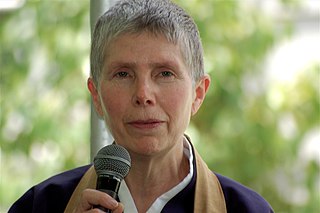A Quote by Dalai Lama
An affectionate disposition not only makes the mind more peaceful
and calm, but it affects our body in a positive way too. On the
other hand, hatred, jealousy and fear upset our peace of mind, make
us agitated and affect our body adversely. Even our body needs peace
of mind and is not suited to agitation. This shows that an
appreciation for peace of mind is in our blood.
Related Quotes
Sensory experience does not offset the intense pain or pleasure we feel on a mental level; it may distract us, but doesn't overcome it. On the other hand, if we have peace of mind, even negative experiences do not upset us. Peace of mind is also good for our physical health. Medical experts have found that anger, hatred and fear eat into our immune system. Being calm and relaxed is better for our physical well-being.
Nakamura Tempu Sensei viewed the mind as a segment of the body that could not be seen and the body as the element of the mind that was observable. He also likened the mind and body to a stream, with the mind as the source flowing down to the body. Whatever we drop in the stream will be carried down by the current. In like manner, our thoughts will influence the body and our well being.
By means of personal experimentation and observation, we can discover certain simple and universal truths. The mind moves the body, and the body follows the mind. Logically then, negative thought patterns harm not only the mind but also the body. What we actually do builds up to affect the subconscious mind and in turn affects the conscious mind and all reactions.
It can be helpful to remember that the enlightened mind and the ordinary mind are two sides of the same coin. The mind is like the sea, which can be rough on the surface, with mountainous waves stirred up by ferocious wind, but calm and peaceful at the bottom. Sometimes we can catch sight of this peaceful mind even in times of trouble. These glimpses of peace show us that we may have more inner resources to draw upon than we had realized. With skill and patience, we can learn how to be in touch with our peaceful selves.
When we speak of a calm state of mind or peace of mind, we shouldn't confuse that with an insensitive state of apathy. Having a calm or peaceful state of mind doesn't mean being spaced out or completely empty. Peace of mind or a calm state of mind is rooted in affection and compassion and is sensitive and responsive to others.
The purpose of meditation is to make our mind calm and peaceful. If our mind is peaceful, we will be free from worries and mental discomfort, and so we will experience true happiness. But if our mind is not peaceful, we will find it very difficult to be happy, even if we are living in the very best conditions.
We forget that we create the situations, then we give our power away by blaming the other person for our frustration. No person, no place, and no thing has any power over us, for “we” are the only thinkers in our mind. We create our experiences, our reality, and everyone in it. When we create peace and harmony and balance in our mind, we will find it in our lives.
A mountain of evidence shows that our bodies are pushing, shaping, even leading our thoughts, feelings, and behaviors. That the body affects the mind is, it's fair to say, incontestable. And it's doing so in ways that either facilitate or impede our ability to bring our authentic best selves to our biggest challenges.
We cannot hope to die peacefully if our lives have been full of violence, or if our minds have mostly been agitated by emotions like anger, attachment, or fear. So if we wish to die well, we must learn how to live well: Hoping for a peaceful death, we must cultivate peace in our mind, and in our way of life.
Realizing that our minds control our bodies while our bodies reflect our minds amounts to understanding the most fundamental aspects of ourselves. It further equals a comprehension of the relationship between our "tools." And since the mind and body are interrelated, this understanding makes it easier to see why coordinating them is a practical way of using these tools to greatest effect-a way of using the mind and body to live our lives as art.
The problem is not in the food... The problem lies in the mind. It lies in our lack of awareness of the messages coming in from our body... Mindful eating helps us learn to hear what our body is telling us about hunger and satisfaction. It helps us become aware of who in the body/heart/ mind complex is hungry, and how and what is best to nourish it.
Identification with the body, with the mind, with our possessions, with our families, with our friends - any kind of identification takes you outwards. All your possessions will be outwards: your wife, your husband, your children, your body - your body is outside you; your mind - your mind is outside you. The only thing that is not outside you is the witnessing. Just the watchfulness - that is your buddha. Identification means losing witnessing, falling into the trap of attachment. That is our misery, that is our slavery.


































